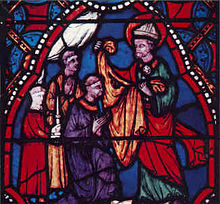Our website is made possible by displaying online advertisements to our visitors.
Please consider supporting us by disabling your ad blocker.
Sidonius Apollinaris
Sidonius Apollinaris | |
|---|---|
 | |
| Born | c. 430 Lugdunum, Gaul, Western Roman Empire |
| Died | c. 485 Clermont-Ferrand, Kingdom of the Visigoths |
| Venerated in | Eastern Orthodox Church Roman Catholic Church |
| Feast | 21 August |
| Major works | Carmina; Epistles |
Gaius Sollius Modestus Apollinaris Sidonius, better known as Sidonius Apollinaris (5 November,[1] c. 430 – 481/490 AD), was a poet, diplomat, and bishop. Born into the Gallo-Roman aristocracy, he was son-in-law to Emperor Avitus and was appointed Urban prefect of Rome by Emperor Anthemius in 468. In 469 he was appointed Bishop of Clermont and he led the defence of the city from Euric, King of the Visigoths, from 473 to 475. He retained his position as bishop after the city's conquest, until his death in the 480s. He is venerated as a saint in the Catholic church, the Orthodox Church, and the True Orthodox Church, with his feast day on 21 August.
Sidonius is "the single most important surviving author from 5th-century Gaul" according to Eric Goldberg.[2] He is one of four Gallo-Roman aristocrats of the 5th- to 6th-century whose letters survive in quantity; the others are Ruricius, bishop of Limoges (died 507), Alcimus Ecdicius Avitus, bishop of Vienne (died 518) and Magnus Felix Ennodius of Arles, bishop of Ticinum (died 534). All of them were linked in the tightly bound aristocratic Gallo-Roman network that provided the bishops of Catholic Gaul.[3] His writing is characterised by an extremely dense network of classical and biblical allusions, which was central to his self-presentation as a Roman aristocrat.
- ^ Apollinaris alludes to the date of his birthday in a short poem addressed to his brother-in-law Ecdicius, Carmen 20.
- ^ The Fall of the Roman Empire Revisited: Sidonius Apollinaris and His Crisis of Identity Archived September 2, 2009, at the Wayback Machine
- ^ Ralph W. Mathisen, "Epistolography, Literary Circles and Family Ties in Late Roman Gaul" Transactions of the American Philological Association 111 (1981), pp. 95-109.
Previous Page Next Page


